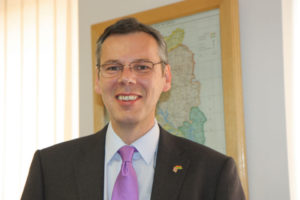British government gets tough on corruption abroad

Corruption is one of the factors identified to be holding back development in poor countries of the world. Millions of dollars are siphoned from locally generated funds, development assistance and businesses lose money from the practice through bribery and patronage. Most foreign companies working abroad are constantly faced with demands by local officials that require them to make extra payments before they are given contracts. These lead to high costs.
Some politicians also lobby local officials to aid companies from their home countries to avoid paying taxes, especially companies from developed countries working in developing countries.
For instance the Telegraph of the UK reported that the British Foreign Secretary William Hague, personally lobbied for Tullow Oil in its dispute with Uganda over capital gains tax.
And in Ghana a Conservative cabinet minister, Andrew Mitchell was reported to have intervened on behalf of Armajaro Holdings which is one of the world’s richest cocoa dealers to get a ban on trading placed on it in the country lifted after receiving £40,000 in donations from the millionaire’s company to his parliamentary office. There has also been the case involving Mabey & Johnson, another British company that was operating in Ghana.
A study conducted by the World Bank recently shows that as much as $1 trillion is lost to corruption globally.
A Communication Specialist of the Ghana Country Office of the World Bamk, Mr Kofi Tsikata, was cited in a GNA report as saying that a report by the Bank revealed that nearly one trillion dollars was lost through corruption and fraud globally every year.
The loss, he was reported to have said was as a result of the reluctance of some officials to help eradicate the canker from the society, which was also affecting business entities.
But the British government says it wants to deal with the problem. The British government this year passed into law the UK Anti-Bribery Act.
“We want the highest possible standards in this area,” the British High Commissioner to Ghana, Peter Jones said in an exclusive interview with ghanabusinessnews.com.
“We take a very serious view of corruption. You mention the new UK bribery Act which just came into force this month, which makes the UK legislation in this area the toughest in the world frankly, and puts an obligation on everybody to report corruption or suspected corruption and make sure that that is dealt with seriously,” he said.
He indicated that the law makes it possible to punish people who are aware of corruption, but do not report it.
“The objective is to make the UK the best example. To be as correct as we can possibly be,” he told ghanabusinessnews.com.
Mr. Jones said, “we have had discussions locally in the UK about whether we are not shooting ourselves in the foot. Asking isn’t this going to make life difficult for UK companies in some environments knowing that it is very difficult to operate in a transparent way that we are demanding?”
“But we have come to the conclusion that in the long term, it is going to be of competitive benefit to the UK. Because our international partners will know that if you are dealing with a UK company or entity, it will be fair, clean and transparent. And if we build on what I hope is already our reputation as good people to do business with, if we can build on that to say we are the world’s best, and we have the highest standards, then in time we are sure that, that will bring commercial dividends as well because it creates confidence, and that’s what you need to have people do business with you,” he said.
When ghanabusinessnews.com asked him whether the British government has the political will to enforce the law against corruption abroad, he responded “we have the political will to enforce this law. The Prime Minister has personally advanced this course and other ministers have talked about it. The Foreign Secretary has given all of us Ambassadors and High Commissioners very clear instructions to take this with the utmost seriousness.”
Mr. Jones reiterated, “our ambition is clear and very strong in this area. I am sure we will see results.”
By Emmanuel K. Dogbevi

good work done mr dog be vi.